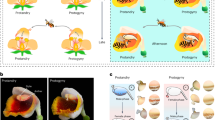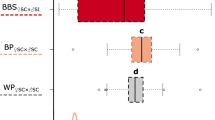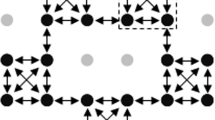Abstract
THE genetic systems of self-incompatibility among the homomorphic flowering plants have been broadly subdivided into two groups1: (1) ‘gametophytic systems’ in which the pollen reaction is determined by the S allele contained in the pollen (Leguminosae, Scrophulariaceae, Solanaceae, Gramineae) and (2) ‘sporophytic systems’ in which the pollen reaction is determined sporophytically by the maternal S genotype.
This is a preview of subscription content, access via your institution
Access options
Subscribe to this journal
Receive 51 print issues and online access
$199.00 per year
only $3.90 per issue
Buy this article
- Purchase on SpringerLink
- Instant access to full article PDF
Prices may be subject to local taxes which are calculated during checkout
Similar content being viewed by others
References
Lewis, D., Biol. Rev., 24, 472 (1949).
Bateman, A. J., Heredity, 9, 53 (1955).
Brewbaker, J. L., Genetics, 42, 361 (1957).
Rajan, S. S., Japanese J. Genet., 32, 258 (1957).
Lewis, D., Heredity, 3, 239 (1939).
Pandey, K. K., Genetics, 41, 327 (1956).
Pandey, K. K., Lloydia, 19, 245 (1956).
Author information
Authors and Affiliations
Rights and permissions
About this article
Cite this article
PANDEY, K. Time of the S Allele Action. Nature 181, 1220–1221 (1958). https://doi.org/10.1038/1811220a0
Issue date:
DOI: https://doi.org/10.1038/1811220a0
This article is cited by
-
The genetic control of self-incompatibility in Linanthus parviflorus (Polemoniaceae)
Heredity (1997)
-
Evolution of homomorphic sporophytic self-incompatibility
Heredity (1988)
-
The relation between pollen exine sculpturing and self-incompatibility mechanisms
Plant Systematics and Evolution (1984)
-
Style antigens of Prunus avium L.
Planta (1981)
-
Ribosome Sites and S Gene Action
Nature (1968)



